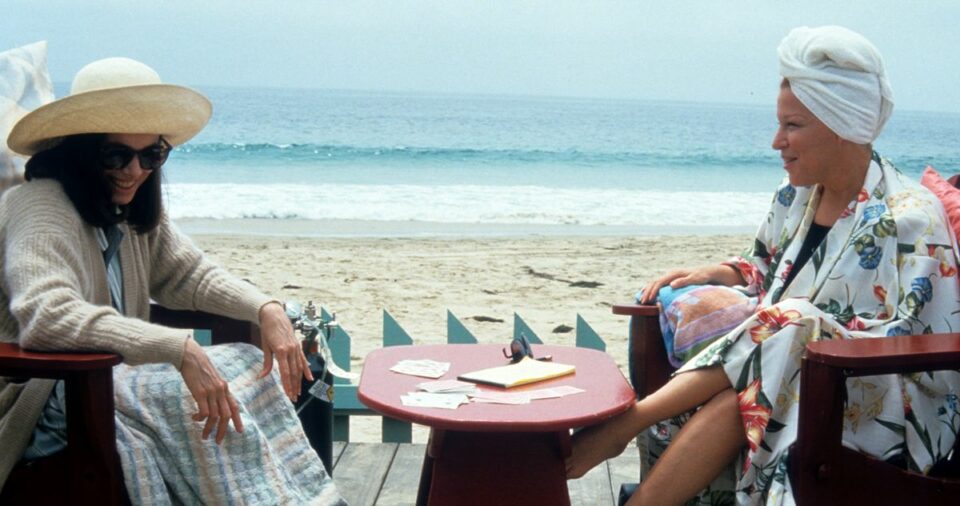Earlier this Weep Week, we noticed that an absolute cry icon had not only visited Bethy Squires’s “An Exhaustive List of Ways TV and Movies Make Us Cry”, but was even compelled by entry no. 35 (“The power of friendship”) to leave a comment:
That’s no less than author and playwright Iris Dart, who wrote one of the Great All-Time Cry-Inducing Stories with her 1985 novel, Beaches, which was thenadapted into the 1988 Bette Midler and Barbara Hershey film of the same name. It’s one of those movies that never fails to make me cry so hard I lose about a liter of snot — and it seems to still have the same effect on its author. I needed to know more, and Dart was kind enough to talk with me from her home overlooking the Pacific Ocean (“I’m a beach girl”) about what it takes to make a cry-movie for the ages.
Let’s talk Beaches.
I should tell you that a few years back, I was on the treadmill watching The View and the guest was The Rock. And one of the young women said to him, “You’re such a big, strong man. Does anything get to you?” And he said, “Yeah, I can’t watch that movie, Beaches.” I practically fell off the treadmill. It was so cute to hear it coming from him, but for some reason, it does get to everybody. It really, really does endure.
Why do you think that is?
I think that people cry or get emotional when they see something depicted that they value. And for me, the moment in the movie that always gets me, unfailingly — and I’ve seen it maybe 30 times — is at the end, when the two friends are together, and they know that it’s the end. And C.C. looks at her best friend reassuringly and says, “I’m here for you.” It makes me think of all the years my close friends carried me, literally, through losses of life, and loves. [Friends who] said, “I’m here,” after 24 years. “Call me at two in the morning if you have to.” And sometimes I had to. In that way, it’s a good cry. It’s a thankful cry.
I had a musical on Broadway called The People in the Picture, and everyone walked out of that one crying, too. The ending was a grandmother and a grandchild, and the grandmother wanting to pass on her stories to her grandchild. I’m a grandmother, and recently my teenage granddaughter sat on the floor of my office and took out old photo albums and did the same thing, so that she would know who I had been and know who came before me. I think those things being so relatable to people, and meaningful to them, is why they cry.
What other works make you cry in a similar vein to Beaches?
One is a movie I saw as a teenager, Imitation of Life. There’s that moment where Susan Kohner, who hasn’t spoken to her mother in years, goes to her funeral and just sobs. It’s that frustration of feeling that you should have done something that you didn’t do. I was very close with my mother, thinking, Oh, that poor girl, to not be able to show that.
Another is the Judy Garland A Star Is Born. I’ve maybe seen it as many times as I’ve seen Beaches. I know every lyric, every line of dialogue. At the end, when he’s going out for a “swim,” and he says, “Let me look at you.” It’s the last time he’s going to look at her. And she leaves the window open so he can hear her singing, and she sings “It’s a New World.” I lose it. I’m gone after that.
And I cry at television commercials! I’m a sob sister, or whatever that’s called. There’s a TV commercial on right now: It’s a woman running down the streets of New York, and then down a hospital corridor. She turns into a room, where her child is having a baby. She says, “Hi, Mom,” and the woman gets into the bed with the daughter and the baby. I don’t even know what the commercial’s for. I think it might be for a bank.
Certain books can do it for me. I’m a friend of Bruce Cameron, who writes all of those dog books, and I was an early reader to give him a jacket quote for A Dog’s Purpose. And I was crying by page 20!
So what’s the trick to writing something that absolutely devastates people?
I think it’s to write what makes you cry, and to tell it from the heart. Like how the friendship in Beaches is based on my love of my friends and my gratitude for all of them being there.
In these friendships, are you more the C.C. or the Bertie/Hillary?
I am definitely the C.C. For years, I wrote on The Sonny & Cher Show. I started as a child actress in Pittsburgh, so I can still do a mean time step. I was a tapper, a little performer starting at about age 6 at the Pittsburgh Playhouse.
Now, you’re adapting Beaches into a stage show, a genre where you can get really emotional with it. What has it been like to revisit these characters, 40 years later, and approach the story with all of the life experience you have now?
I’m turning 80 in two weeks. My composer is 90, and he’s turning 91. So, yes, there’s a lot of life experience between us. And it’s wonderful. There are so many opportunities for songs in the story, because it’s about a singer, but also because the story makes sense as a musical, whereas a lot of things that are developed as a musical … shouldn’t be. I’m working with a brilliant tunesmith, Mike Stoller, who really gets me, and gets the show. Writing a musical is more about what to leave out. I was trying to tell everything that’s in the book, but it had to be simplified. That’s always painful, but now it’s a quintessential story about the two women.
My first writing partner in college was Stephen Schwartz. We wrote the varsity musical at Carnegie Tech two years in a row, and we are still great friends all these years later. He came to a reading of one of my shows, and he said that what he had learned with Wickedwas that it’s always gold when you’re with the two girls. That informed a lot of the cuts that I made. It’s about these two women, and their relationship. It was a good note from an old friend.
Are there parts of Wicked that make you cry?
Oh, yes, “For Good.” I love that song every time, no matter who sings it.
It is a song that would completely work for the main characters in Beaches. It has the exact same emotional tone.
What’s funny about that is, in Ben Brantley’s review of Wicked, which was not a good one, he said something like, One of the songs could have been lifted from a musical version of Beaches. [The actual quote: “The other side involves the ambivalent, ever-shifting relationship between Elphaba and Glinda, in which the adversarial women learn from each other and which recalls sobfests about female friendships like the movie Beaches.”]
I wrote to Stephen, saying, “He should know just how far back your relationship to Beaches goes!” He and I started writing together when he was 16 and I was 19. He was a freshman at Carnegie and I was a junior.
That’s such a full circle moment, particularly when your work is about old, enduring friendships.
Women will come up to me, when they find out what I’ve written, and they will say about their friend, “She’s my Beaches.” Not “She’s my best friend.” “She’s my Beaches.” Whatever that means. I am one thing, and she is another, and somehow we add up to a great friendship. I’ve had so many women say that to me, and it makes me know that they get it.
Beaches kills me.
I need to have a bumper sticker that says that.
This interview has been edited and condensed for clarity.
Related
- An Exhaustive List of Ways TV and Movies Make Us Cry
Rebecca Alter , 2024-02-16 22:11:25
Source link


